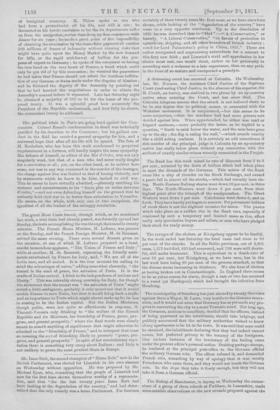The great Mont Cenis tunnel, through which, as we mentioned
last week, a trial train had already passed, was formally opened last Sunday, tho train accomplishing the run through the tunnel in twenty minutes. The French Home Minister, M. Lefranc, was present on the Sunday, and the French Foreign Minister, M. do Remusat, arrived the same evening. There were several dinners given on the occasion, at one of which M. Lefranc proposed as a toast, amidst tremendous applause, "The Union of France and Italy ;" while at another, M. do Remusat, expressing the friendly senti- ments entertained by France for Italy, said, " We are all of the Latin race, and all united. It is the true moment for calling to mind the advantages of union," adding somewhat obscurely, " the tunnel is the road of peace, the salvation of Turin. It is the cradle of Italian revival. I drink to the independence of nations and liberty." This was tolerably strong courtship for Italy, for though the statement that the tunnel was " the salvation of Turin" might sound a little ambiguous, probably it only zu.eant not that it would enable France to save Turin, but that it would bring back a traffic and an importance to Turin which might almost make up for its loss in ceasing to be the Italian capital. But the Italian Ministers, though polite, were not quite so affectionate in response, S. Visconti-Venosta only drinking to "the welfare of the French Republic and its Ministers, the friendship of France, peace, pro- gress, and general prosperity," where the final words were clearly meant to absorb anything of significance that might otherwise be attached to the " friendship of France," and to interpret that toast as meaning the sort of friendship likely to promote "peace, pro- gress, and general prosperity." In spite of her revolutionary repu- tation there is something very canny about Italians ; and Italy is not unlikely to prove the most prudent State in Europe.






























 Previous page
Previous page